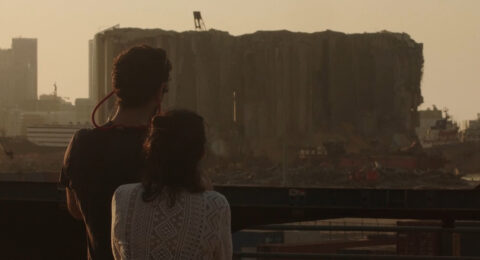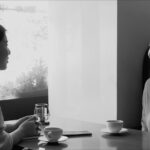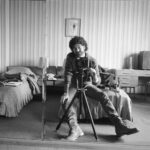Making any feature film on an indie budget is a minor miracle. Favours must be pulled, late nights are a given and disasters have to be averted on an almost constant basis. Everything you lack in pure hard cash has to be made up for in graft, dedication and quick thinking.
Some behind-the-scenes documentaries, such as Hearts of Darkness: A Filmmaker’s Apocalypse (Fax Bahr, George Hickenlooper, Eleanor Coppola, 1991) and Burden of Dreams (Les Blank, 1982) are almost as compelling as Apocalypse Now (Francis Ford Coppola, 1979) and Fitzcarraldo (Werner Herzog, 1982) respectively — pulling back the curtain on the chaos while also showing the price of realising egotistical, out-of-the-box, unethical, problematic visions.
Joining this genre with a smaller, yet perhaps more poetic and intimate entry is Crystal Globe competition entry Dancing on The Edge of a Volcano (Cyril Aris, 2023), capturing the behind-the-scenes struggle to get Costa Brava, Lebanon (Mounia Akl, 2021) made.
The script is written. Development is finished. The players have been cast. The crew has been hired. But about a month out from pre-production, on August 4th, 2020, the unthinkable happens. In images seen across the world, the port city of Beirut is rocked by the explosion of 2,750 tonnes of ammonium nitrate — causing 218 deaths and 7,000 injuries while leaving 300,000 people homeless. Meanwhile, it’s the height of COVID-19, causing further complications for an already stretched crew.
Headed by the passionate Akl, lacking the egotism of Coppola and the carelessness of Herzog (multiple people died in the making of Fitzcarraldo), production plows on regardless, the context of modern-day Lebanon feeding into the film’s own politically-minded storyline concerning a family leaving the capital to live in the countryside. Battling border restrictions, cast and crew being infected, the devaluation of the Lebanese pound, gas running out and blackouts, amongst various other clusterfucks and omnicrises, Dancing captures the difficulty of creating art in almost impossible circumstances.
When not simply watching and observing the cast and crew — including Capernaum (2018) director Nadine Labaki in the lead role opposite Palestinian actor Saleh Bakri — Aris weaves in political and philosophical observations about Beirut; once feted as the Paris of the Middle East, commenters warn it could descend into a new Somalia. Filmmaking at once becomes a balm, a therapeutic outlet and a form of escapism. After all, it’s better to work than sit around and worry about everything.
I have not seen Costa Brava, Lebanon. It might be awful or it might be, in the words of Screen Daily, “a terrific feature debut from Mounia Akl which works both as a compelling domestic drama and an elegant political allegory.” The brief clips inserted throughout this documentary seem professional enough. The quality of the filmmaking is almost beside the point. The mere fact that they pulled together makes for a fascinating portrait of resilience. And the sheer belief in creating something meaningful amongst such circumstances is a kind of beauty in and of itself.
Redmond is the editor-in-chief of Journey Into Cinema.





